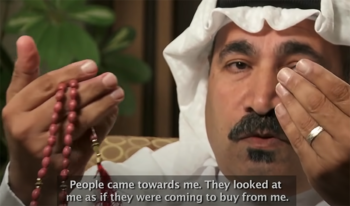
By Michael Ashcraft —
Abu Ahmad, a Kuwaiti refugee in Jordan, felt compassion for the Christians who enrolled his son tuition-free in a private school when he was down on his luck.
“Honestly, it is not fair that these people go to Hell,” he told his wife. “They are kind, have good manners and like to help. I must go to them, tell them about Islam and make them Muslims who can go to Al Jannah.”
So Adel — as he is also called — began to share what he thought was the truth about Allah with a school official.
“I started vigorously discussing matters with them,” he remembers on a Strong Tower 27 video translated by subtitles. He even thought things might deteriorate into a brawl. “I had my hands ready to box him.”
“Honestly, I saw you were properly dressed and thought you were well-educated, but it turns out you neither know nor understand anything,” he said to the school official.
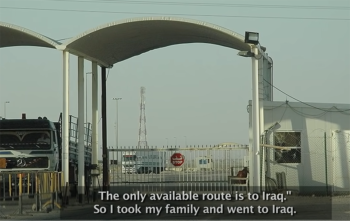
“I thought he would become angry and hit me, so I had my fist ready to hit him before he did.”
Instead, the school official smiled. He treated Abu with respect and appreciation.
Abu was thrown off. “He was smiling and treated me well. Why? What’s the difference?” he marveled. “If someone talked to me like that, I would kill him.”
Abu Ahmad’s flight to Jordan began with the Iraqi invasion of Kuwait in 1990. Saddam Hussain quickly overwhelmed the small, oil-rich nation, but an international military coalition purged him from his Persian Gulf neighbor.
Abu and his family were in danger and sought to flee. The road to Saudi Arabia was closed, they heard. So they fled to Iraq, where they hunkered down in Al Basra for four years, not able to return to Kuwait because they were accused of being traitors.
“If they knew I was Kuwaiti and staying there, they would kill us all for sure,” Abu recalls.
Eventually, he found a guide who would smuggle him and his family into neighboring Jordan. He found employment distributing first tea, then gas. Eventually family relations from Kuwait sent him money, and he opened a small shop.
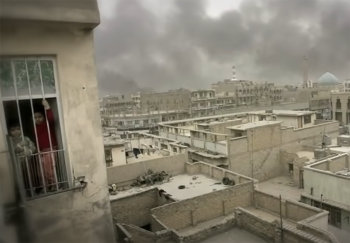
Before in Kuwait, Abu had been a millionaire. But now his fortunes were reduced to scrambling for money.
In the first month of being open, he was able to make rent, 200 dinar.
But in the second month, he scrounged only 150 JOD by the time the landlord came.
“Here’s 150,” Abu told him. “I will give you the other 50 tomorrow.”
“No man,” the landlord retorted. “I want all the rent now.”
Despairing, Abu beckoned people out in front of his shop to come in and buy.
“When people came towards me, they looked like they were coming to buy from me,” he remembers. “But when they approached, they would either go in the shop on the right or the left. It was as if there was a curtain blocking my shop.”
He sat down, frustrated, in front of his shop and tried to think of a solution.
Suddenly he felt a strange urge to look under his chair. To his surprise, he saw and picked up a small wooden cross. He could not imagine how it got there.
Then he remembered the nice people at the Christian school who had selflessly opened the doors to his son. He remembered how he had been disrespectful, and they returned love for ill will. He remembered the one church service he had attended, sitting at the back with his wife.
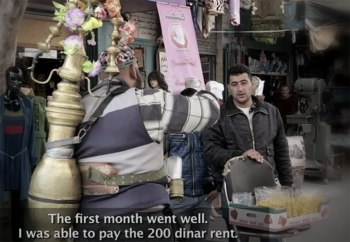
Then he did something unexpected, he prayed to the God of the Christians.
“Jesus Christ, if You really are God, as they say, then help me now,” he uttered heavenward. “If You help me, I will surrender my life to You.”
Immediately after he prayed, his Egyptian friend from the next shop threw down his broom and said, “Let’s go to my friend.”
“This is Abu Ahmad,” he told the friend when he opened the door. “He needs 50 dinar to pay the rent.”
The Egyptian man went in and brought out a $100 bill.
Abu was aghast. “You are Egyptian,” he objected. “You need to send the money to your family in Egypt. How can you trust me and give me the money when you need it more?”
“If you want to return it, return it,” the man replied. “If you don’t, don’t.”
Abu was both shaken and amazed. Jesus had answered his prayer, and he wasn’t ready to believe it.
“I wanted to prove that what happened was by chance,” he remembers. “I wanted an excuse proving that Christ did not answer. But it became obvious that Christ had answered the prayer.”
In response, he surrendered his life to Jesus and was born again.
Not long after this remarkable answer to prayer, Abu told his wife he was now a Christian.
“Are you crazy? Have you lost your mind?” Laila shrieked. “You went to try to change them, and they changed you.”
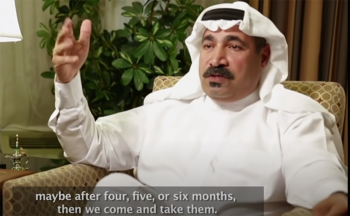
She divided their room with a blanket hung from the ceiling.
“You are no longer my husband. You are an infidel,” she said, outraged. “This is your space. “The other is for me and my children. Don’t come near us or interfere in our lives.”
And that is how they lived from then on.
Sometime later, a friend suggested he apply for refugee status through the United Nations. But in a twist of events, the U.N. official sent him to jail.
Abu cried out to God from his cell: “Lord, You said, ‘Come to me all who are weary and burdened, and I will comfort you.’ There is no heavier burden than the one I am carrying,
“You said, ‘I will never leave you nor forsake you,’” he said. “Where are You? Why did You leave me alone?”
On the eighth day of praying in his jail cell, Abu felt the prison shake.
A well-dressed official was introduced into the prison by the warden.
“I am the U.N. representative,” he told Abu. “I am here to take you.”
Abu and his family were taken as refugees to another country.
The only thing remaining for Abu was to pray for six months for his wife and kids, who steadfastly affirmed Islam. For this, Abu held to the Biblical promise: Believe and you and your household will be saved.
“I wanted my wife and kids back,” he says.
At the end of six months, he gently challenged his wife to ask the “Creator of Heaven and Earth” for the truth.
Laila accepted.
One Sunday morning, she joyfully woke him. She had dreamed she was wearing the black cloths of Islam and had died. But she was told she could come back to life if she bathed in some waters. There, fully clothed, her dress turned from black to white.
“What more do you want?” he asked after she had related the dream. “The black clothes are our sins in Islam. You are dead. Anyone who doesn’t have Christ is dead. When they put you in the water, you died with Christ and rose with Him. Your clothes became white because Christ washed all your sins away.”
Laila got saved that day.
Today, Abu’s oldest son is Pastor Ahmed. His middle son serves Christ in two churches. His daughter serves alongside him at church.
“My family and I worship the Lord and serve the Lord together,” he says.
If you want to know more about a personal relationship with God, go here
Reporter Michael Ashcraft is a pastor and a financial professional based in Los Angeles.




[…] On the eighth day of praying in his jail cell… Read the rest: Abu Ahmad proselytized Christians, he himself became converted. […]
Comments are closed.